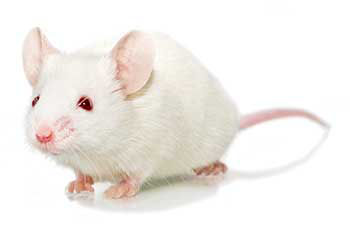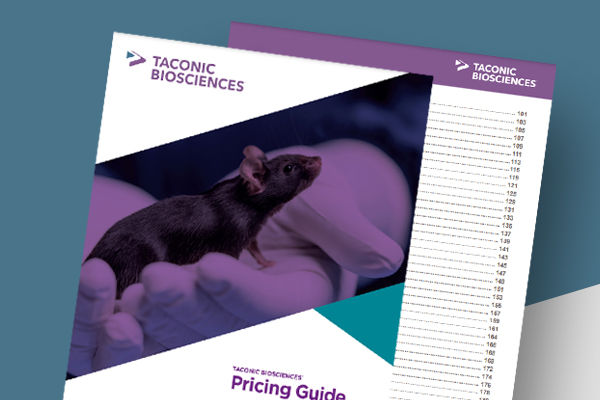| Model No. | Nomenclature | Genotype |
|---|---|---|
| NMRI-F | BomTac:NMRI | |
| NMRI-M | BomTac:NMRI |
NMRI

- Description
- Related Products & Services
- Data
- Growth Chart
- Price & Licensing
- Health Report
- Overview
- Genetics
- Guides & Publications
- Applications & Therapeutic Areas
- Transit, Housing & Welfare
- Diet
Overview
Nomenclature: BomTac:NMRI
- Extensively used as an experimental animal in many fields of general biology as well as in pharmacology and toxicology
- Commonly used as a control for selection experiments
- Develops a wide variety of spontaneous tumors and an increasing incidence of renal disease with age
Origin
Genetics
Guides & Publications
Applications & Therapeutic Areas
- Safety Assessment
- Vaccine Research
Transit, Housing & Welfare
Need more info? Click the live chat button or Contact Us
Packing Practices
Taconic standard practice is to recombine animals of different home cages and/or ages from a single model and sex during packing, except in specific cases where Taconic's animal welfare policy prohibits recombination due to aggression or other concerns. When an order is fulfilled with animals from more than one week of birth, this standard practice results in animals from a range of birth weeks packed together in a single TTC. When an order is fulfilled with animals from genotyped models, this standard practice results in animals from different home cages packed together in a single TTC.
Customers who wish to keep animals from different weeks of birth separated should place orders with the special instruction "Divide and label by age." Note that this special request can result in increased costs for additional Taconic Transit Cages, dividers and/or freight charges.
Taconic discourages other types of custom packing requests as they can have a negative impact on animal welfare. Learn more.
Diet
- Services
Data
Average litter size: 10
Life-span of males short in conventional conditions (430 days) but long in females (750 days) (Storer, 1966). Life-span in SPF fostered conditions also short in males (490 days) and long in females (690 days) (Festing and Blackmore, 1971).
Spontaneous glomerulonephritis occurs in the NMRI mouse stock at a relatively high incidence. In a study concerning spontaneous diseases in NMRI mice, glomerulonephritis was found to account for severe illness in 27.2% of the cases (Deerberg F & Müller-Peddinghaus 1970). The frequency of histologically proven glomerulonephritis increases with age reaching a frequency of 43.8 % at 22-24 months.
In 95.2 % of all the cases of glomerulonephritis two or more of the four employed immunoglobulin classes and subclasses (IgG1, IgG2, IgA, and IgM) can be detected by immunoflourescence. Glomerular deposit of IgG starts at an age of 6 month and increases with age.
The histological picture of glomerulonephritis includes cell proliferation in the glomeruli, deposit of PAS-positive substance and increase in the mesangial matrix. In the final stages of the disease fibrosis in the glomeruli and lesions in the tubuli and interstitium are found. Clinical symptoms are limited until the final stage which is characterised by ascites and massive edema. Increased proteinuria is seen in some animals during the development of the disease (Deerberg & Gleichman 1980).
Antinuclear antibodies or antiboides against erythrocytes are not found in connection with the development of glomerulonephritis in NMRI mice in contrast to the glomerulonephritis in ZBWF1 and MRL/Mp-lpr mice which serve as the animal model for the human disease (Deerberg & Gleichman 1980).
The NMRI mouse is widely used as an experimental animal in many fields of general biology as well as in pharmacology and toxicology. NMRI mice may serve as a base population for a selection experiment, in which case it is especially desirable to perpetuate a random bred line as a control. Furthermore, they may serve as a population harboring deleterious mutations.
Traditionally random bred laboratory animals have been used extensively in toxicological studies, because they have been said to have a degree of variance similar to what would be expected in the human population. However, outbred stocks are genetically variable to the extent that all individuals are genetically unique, but they tend to be relatively uniform in comparison with the variability within the species. The toxicological testing of a compound in a single stock of outbred animals can be said to be equivalent, genetically, to doing clinical trials in an isolated human population such as certain groups of Eskimos, Bushmen, etc.
An alternative strategy for testing would be to use a number of different inbred strains of the same species, the so-called factorial experiment. This could be done by carrying out the animal tests on a sample of five to ten inbred strains. The advantages of this strategy would be that the factorial experiment, still using the same number of animals as in the classical design, would include a wider range of phenotype variations within the test species thus indicating whether the response to the drug is under genetic control. In this way the test would be statistically more powerful. (Festing 1979, Festing 1987, Shimkin 1974, Haseman & Hoel 1973).
For some applications, weight may be critical. For orders where weight is critical, please place orders by weight, not by age. Taconic can accept orders by weight for this model. For orders sourced from US or Denmark a production minimum 3 gram span is accepted. All weights are weights at time of packing. Mice and rats can lose weight in transit. Orders for specific weight spans will be assessed a nominal fee. More detail on weight order policies is available.
n= 50 per sex at the MPF health standard from all global colonies. Data collected 2013-15.
High and Low represent mean +/- 2 standard deviations.
Based on sample size the charts above represent ~75% of the population.
All growth curves represent animals housed in our barriers, at our standard density and fed NIH31-M diet. Variations at customer facilities will alter expected growth curves. Growth charts are provided only as a guide, if a specific weight criteria is needed please order animals by weight.
Customize this chart by clicking the legend elements.
- Licensing
- Pricing - USD
- Pricing - EUR
- Pricing - USD Nonprofit
- Pricing - EUR Nonprofit
- Select my Health Standard
- Get Custom Pricing Guide
Licensing
Terms of Sale and Use for NMRI
These models are sold subject to Taconic's Terms and Conditions for Taconic's Models, Products and Services
Pricing - USD
Murine Pathogen Free (MPF) Health Standard
NMRI Female
NMRI-F
Available now
| Age in Weeks | Quantity 1 - 999 |
|---|---|
| 3 to 4 | $ 25.00 |
| 5 to 7 | $ 26.00 |
| 8 to 10 | $ 28.00 |
Specialized Inventory
| NMRI-FL | Quantity 1 - 199 |
|---|---|
| Female With Litter | $ 170.00 |
Specialized Inventory
| NMRI-TP | Quantity 1 - 999 |
|---|---|
| Timed Pregnant Female | $ 208.00 |
Specialized Inventory
| NMRI-UP | Quantity 1 - 199 |
|---|---|
| Untimed Pregnant Female | $ 162.00 |
*Untimed pregnant requests are filled with late gestation pregnant females. Pups may be delivered in transit.
NMRI Male
NMRI-M
Cohorts are reserved upon order placement and will take 2-4 weeks to fulfill. An estimated lead time will be provided to you within 2-3 business days.
| Age in Weeks | Quantity 1 - 999 |
|---|---|
| 3 to 4 | $ 25.00 |
| 5 to 7 | $ 26.00 |
| 8 to 10 | $ 28.00 |
Pricing - EUR
Murine Pathogen Free (MPF) Health Standard
NMRI Female
NMRI-F
Available now
| Age in Weeks | Quantity 1 - 999 |
|---|---|
| 3 to 4 | 23,00 € |
| 5 to 7 | 24,00 € |
| 8 to 10 | 25,00 € |
Specialized Inventory
| NMRI-FL | Quantity 1 - 199 |
|---|---|
| Female With Litter | 155,00 € |
Specialized Inventory
| NMRI-TP | Quantity 1 - 999 |
|---|---|
| Timed Pregnant Female | 189,00 € |
Specialized Inventory
| NMRI-UP | Quantity 1 - 199 |
|---|---|
| Untimed Pregnant Female | 147,00 € |
*Untimed pregnant requests are filled with late gestation pregnant females. Pups may be delivered in transit.
NMRI Male
NMRI-M
Cohorts are reserved upon order placement and will take 2-4 weeks to fulfill. An estimated lead time will be provided to you within 2-3 business days.
| Age in Weeks | Quantity 1 - 999 |
|---|---|
| 3 to 4 | 23,00 € |
| 5 to 7 | 24,00 € |
| 8 to 10 | 25,00 € |
Pricing - USD Nonprofit
Murine Pathogen Free (MPF) Health Standard
NMRI Female
NMRI-F
Available now
| Age in Weeks | Quantity 1 - 999 |
|---|---|
| 3 to 4 | $ 25.00 |
| 5 to 7 | $ 26.00 |
| 8 to 10 | $ 28.00 |
Specialized Inventory
| NMRI-FL | Quantity 1 - 199 |
|---|---|
| Female With Litter | $ 170.00 |
Specialized Inventory
| NMRI-TP | Quantity 1 - 999 |
|---|---|
| Timed Pregnant Female | $ 208.00 |
Specialized Inventory
| NMRI-UP | Quantity 1 - 199 |
|---|---|
| Untimed Pregnant Female | $ 162.00 |
*Untimed pregnant requests are filled with late gestation pregnant females. Pups may be delivered in transit.
NMRI Male
NMRI-M
Cohorts are reserved upon order placement and will take 2-4 weeks to fulfill. An estimated lead time will be provided to you within 2-3 business days.
| Age in Weeks | Quantity 1 - 999 |
|---|---|
| 3 to 4 | $ 25.00 |
| 5 to 7 | $ 26.00 |
| 8 to 10 | $ 28.00 |
Pricing - EUR Nonprofit
Murine Pathogen Free (MPF) Health Standard
NMRI Female
NMRI-F
Available now
| Age in Weeks | Quantity 1 - 999 |
|---|---|
| 3 to 4 | 23,00 € |
| 5 to 7 | 24,00 € |
| 8 to 10 | 25,00 € |
Specialized Inventory
| NMRI-FL | Quantity 1 - 199 |
|---|---|
| Female With Litter | 155,00 € |
Specialized Inventory
| NMRI-TP | Quantity 1 - 999 |
|---|---|
| Timed Pregnant Female | 189,00 € |
Specialized Inventory
| NMRI-UP | Quantity 1 - 199 |
|---|---|
| Untimed Pregnant Female | 147,00 € |
*Untimed pregnant requests are filled with late gestation pregnant females. Pups may be delivered in transit.
NMRI Male
NMRI-M
Cohorts are reserved upon order placement and will take 2-4 weeks to fulfill. An estimated lead time will be provided to you within 2-3 business days.
| Age in Weeks | Quantity 1 - 999 |
|---|---|
| 3 to 4 | 23,00 € |
| 5 to 7 | 24,00 € |
| 8 to 10 | 25,00 € |
Select my Health Standard
Need help choosing the right Taconic Biosciences health standard for your research?
Use the Health Standard Selector to enter your exclusion list. The tool will tell you which health standards meet your requirements.
Get custom pricing guide
Schedule A Scientific Consultation
Speak with a PhD-level Field Application Scientist who can help you select the most appropriate model and maximize your experimental success.
Smart Select Program
Trial an Animal Model for Quality & Compatibility Assurance
As longtime facilitators of animal-based research, we understand the importance of aligning your project goals and procurement priorities to support advancements in your research.
- Evaluate a specific model strain, before making any financial investment
- Request up to 20 animals from one of the strains listed below, to test for quality, consistency, and suitability for your experimental purpose
- Enjoy free ground shipping, where applicable (see table for more details)*















.jpg)

.jpg)
.jpg)
.jpg)
.jpg)





.jpg)


.jpg)
.jpg)

.jpg)


.jpg)





.jpg)

.jpg)





